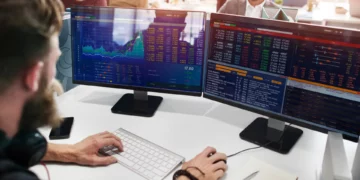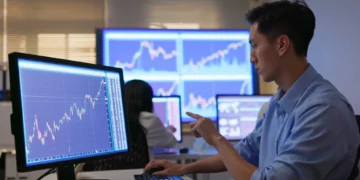Hong Kong stocks experienced their worst day during the global financial crisis from 2007 to 2009, as the index dropped by 12.7%.
Hong Kong‘s stock market experienced its largest single-day drop in almost 30 years, since 1997, due to the panic wave brought on by US President Donald Trump‘s tariff announcement.
It intensified market turmoil due to concerns over an increasing trade conflict as China’s sovereign wealth fund stepped in to steady domestic stock prices.
The benchmark Hang Seng Index, a market-capitalisation-weighted stock market index in Hong Kong, fell by 13.22%. It had dropped intraday by as much as 13.74%.
Shares of tech, solar, banking, and online retailers dropped as investors pulled out from all companies related to global growth and trade.
It marked the steepest drop for Hong Kong stocks since the index fell 13.7% in one day during the 1997 Asian financial crisis.
Hong Kong stocks experienced their worst day during the global financial crisis from 2007 to 2009, as the index dropped by 12.7%.
Asian stock markets also plummeted on Monday, starting the trading week with one of their weakest openings in decades.
All 14 major equity indices in the Asia-Pacific region declined, with 11 reaching their lowest points in at least 52 weeks. The Nikkei 225 of Japan fell by 7.8%, South Korea’s Kospi decreased by 5.6%, Australia’s S&P/ASX 200 went down by 4.2%, and Singapore’s Straits Times Index declined by 8%.
The fall came after Trump reaffirmed his broad tariffs after China, which is now facing US tariffs of over 50%, declared it would respond with a 34% tariff on US imports.
During a press briefing, Hong Kong’s Financial Secretary Paul Chan Mo-po stated that Hong Kong citizens should be prepared for a volatile stock market trading soon.
The United States will fall into recession, unemployment can increase, and US consumers will face the consequences.
Since the announcement of the reciprocal tariffs, the US stock market has seen a decline of US$6 trillion in its market capitalization.
Since Friday was a public holiday in Hong Kong, the current situation reflects the response to Trump’s tariffs and China’s retaliation.
Carlos Casanova, a senior economist at UBP in HK, describes it as a “double whammy”.
The escalating fight between the two largest economies threatened the trade flows. It will also impact Chinese revenues and cause a decline in global demand amid China’s sluggish growth.
Alicia Garcia-Herrero, chief economist for Asia Pacific at Natixis, noted that the decline in Hong Kong shows precisely the market expectations regarding the impact of tariffs on China rather than the stock markets on the Chinese mainland.
The issue is that in China, free trading is not possible. Free trading is a policy by which a government does not discriminate against imports or interfere with exports by applying tariffs to imports or subsidies to exports. But it is possible in Hong Kong. It reflects current events far better than Chinese stocks do.
Hong Kong stocks were the worst performers on the day when Asia’s market was down, with significant drops in equities from mainland China, Japan, South Korea, Taiwan, Australia, and Singapore.
Since Trump announced sweeping tariffs on nearly all countries on Wednesday, global stock markets have lost trillions of dollars in value.
On Sunday, US customs authorities started applying a baseline tariff of 10% on imports, while higher duties ranging from 11% to 50% will take effect on Wednesday.
Since Trump announced “Liberation Day,” US stocks have lost over $6 trillion.
When Wall Street reopens on Monday, further significant losses are anticipated, as futures linked to the benchmark S&P 500 and the tech-focused Nasdaq-100, traded outside of regular market hours, have dropped by 2.7% and 3.55%, respectively.

















